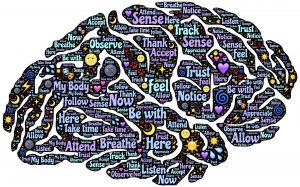Stress seems to be something that’s simply unavoidable in the modern age.
It can begin in childhood or the teenage years due to family issues, exams, peer pressure or social media. When we become adults the stress triggers can continue within our workplace, as a result of financial pressures, struggling as working parents or from emotional or family problems.
Dealing with stress is important in order to prevent it from becoming all-encompassing and detrimental to your everyday life. Left unchecked it can have a serious effect on your mental health.
One way in which you can take hold of your stress and begin to manage the symptoms better is learning how to practice mindfulness.
But what exactly is mindfulness?

Professor Mark Williams, former director of the Oxford Mindfulness Centre, described mindfulness as “knowing directly what is going on inside and outside ourselves, moment by moment.”
Think of it as a very simple form of meditation or relaxation, a method of mental training to focus on the present and think only about what is happening in the here and now. This mental training means that as people become more aware of their thoughts, feelings, and body sensations, they are able to manage them effectively – rather than being overwhelmed by them.
It’s something that anyone can do, young or old, and once you find the particular technique that works for you, it really can boost your attention and concentration, and give you greater insight into your emotions.
Practicing mindfulness does take effort and work to develop the right skills – and of course you need to make the time to practice them.
Some of the benefits of mindfulness are:
- Mental health – studies have proved that practicing mindfulness can boost your mental health by decreasing depressive symptoms, anxiety, and stress. Mindful thinkers are more able to regulate their emotions, which in turn leads them to be able to manage them better.
- Memory – tests have also shown that mindfulness improves working memory, not to mention creativity, attention span and reaction speeds.
- Sleep – by reducing factors that can lead to sleep problems, you may find your quality of sleep improves.
- Physiological changes – mindfulness actually enhances brain function by increasing grey matter in areas associated with self-awareness, empathy, self-control and attention. It can also reduce the effects of an aging brain by reducing the thinning areas of the brain that naturally occurs as you age.
- All round health benefits – by reducing the risk of hypertension through lowering blood pressure your heart and circulatory health can be improved.
Here are some simple tips you can try to begin practicing mindfulness. You can do these on your own, sitting or standing and at any time.

- Find a quiet relaxed environment away from distractions.
- Let your breath flow effortlessly in and out of your body, breathing in through your nose and out through your mouth if you can.
- Whilst breathing, let go of all your thoughts. Try to clear your mind of everything, concentrate only on your breathing.
- Your sense of awareness should be focused on your breath’s pathway as it enters your body.
- Then with your focused sense of awareness, watch as your breath works work its way out of your mouth and its energy dissipates into the world.
Mindfulness is about more than breathing though. It’s about observing what’s around in the world and paying real focused attention to it. Listening intently to specific things
(try closing your eyes when you do so) and being fully aware of appreciating exactly what’s around you.
Why not give it a try! There are various apps available such as Headspace which can help to get you started!




